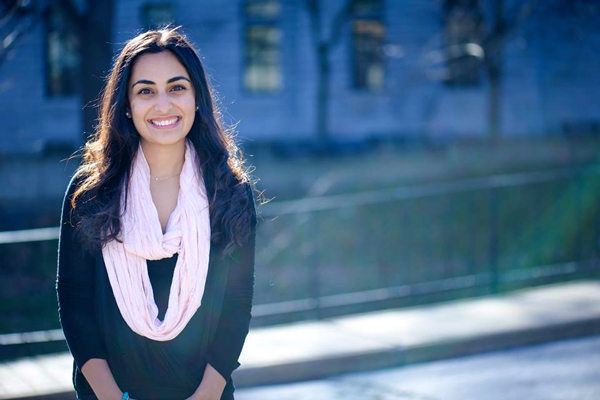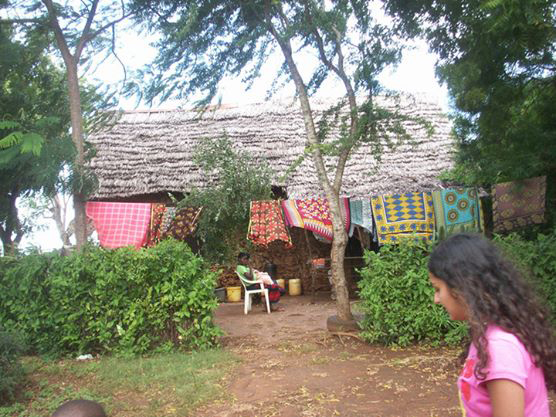
By Neale McDevitt
EDITOR’S NOTE: Salima Visram is doing her undergraduate degree in International Development Studies. As part of her independent research study under Anita Nowak, Visram has designed a solar backpack that would allow children living without electricity in impoverished areas to pursue their studies after sunset. By getting good grades in primary school, these children will increase their chances of being accepted into secondary school and, ultimately, be better armed to break the cycle of poverty. The prototype backpack has been made but, for the project to come to fruition, Visram needs the public’s help.
Life is not easy for the 22,000 inhabitants of the Kikambala village just outside Mombasa, Kenya. Most families live well below the poverty line, with many surviving on less than a dollar a day and without electricity or running water. If ever a place needed a guardian angel, Kikambala would be it.
Enter Salima Visram.
Visram, now in her final year in International Development Studies, grew up in Mombasa. Her parents, who operate a successful beach resort, instilled in their children an appreciation for what they had and empathy for people who are not as fortunate. But in the Visram household, empathy means action.
Not content with merely providing employment at the resort for locals, the Visrams have also built a nursery school in Kikambala and established the village’s first health clinic where, on top of medical services, people have access to free fresh water. Today, Salima’s sister is building a secondary school – the village’s first – in Kikambala.
“This came from my grandfather, who moved to Mombasa and started the resort,” said Visram. “He always impressed upon us how lucky our family was. He set one goal for the family; as the family business grew, we had to make sure the people around us grew too. My parents embraced that.”
Visram and her siblings spent Saturdays at the government school in Kikambala, playing with the children and learning firsthand about the effects of poverty.
When she heard how very few of the children who attended the Kikambala Primary School could afford a lunch, Visram – herself still in elementary school – sponsored a child’s lunches for a year with her own money saved from birthday presents, etc. It was a tradition she kept going for years.
One of the things Visram loved most about her Saturdays at the village school was listening to the school choir. Immensely talented, the choir didn’t have the financial means to compete at the prestigious Kenya Music Festival. Taking matters into her own hands, 12-year-old Visram began a small business designing and selling jewelry. All profits went to the choir. Within two years, the choir not only made it to the festival but was also named the top choir in the country.

Skip ahead to 2014. Though thousands of miles away from home, Kikambala is very much top of Visram’s mind.
“These days, all I do, all I think about is backpacks,” she says with a laugh. In particular, she’s thinking about the model she’s designed – the Soular Backpack. The concept is ingenious in its simplicity. Equipped with a solar panel whose storage battery can later connect to an LED lamp, the device will allow children in rural areas, who have no access to electricity, to study well past sunset.
“If children can’t study after sunset, it makes it difficult to get good grades, which, in turn, often means they can’t get into secondary school,” says Visram. “Without education as an option, many of these children turn to prostitution.”
“One thing [the people of Kikambala] have a lot of is sunlight,” says Visram, noting that many children spend hours walking to and from school beneath the unrelenting sun. “I just had to find a way to use it.”
Solar-powered pens, shoes and hats were just some of the ideas Visram considered early on. Nothing was feasible. Frustrated, Visram was sitting in a coffee shop earlier this summer when the idea for the Soular Backpack came to her. “It was my light bulb moment,” she says.
“It was very exciting,” continues Visram. “I immediately started searching online databases. That night I created an email account and got in touch with 50 different suppliers and got them to start designing the backpack. In all I’ve been in contact with at least 100 different suppliers.”
Having settled on the design, Visram is poised to start production and begin a pilot project in Kikambala. The goal is to raise $40,000 by the end of December in order to produce 2,000 backpacks and distribute them free of charge to school children back home. Once the project is up and running, she will look for possible ways to improve the design as well as finding ways to measure what kind of impact Soular Backpacks will have on children’s grades.
“Through my social entrepreneurship classes here at McGill, I’ve learned the benefit of iterative prototyping where you go in, try it, and try to see how much you can improve it,” says Visram. “It’s not just finding a solution to the problem, it’s finding the best solution.”
And for Visram, finding that solution is a full-time job. Not only is she using Soular Backpack for her independent research study under Anita Nowak, she is also developing her business plan as part of another class. “I’m working on this more than 30 hours a day – and more than a few sleepless nights,” she says with a laugh.
This week, thanks to funding from the McGill’s Institute of the Studies of International Development as well as The Social Economy Initiative, Visram is in Mexico City at the Global Social Business Summit where she plans is busy promoting her backpacks and networking with people working on like-minded projects. “I am so grateful to McGill for having been so generous,” she says. “I couldn’t have done this otherwise.”
Visram has big plans, including forming partnerships with UNICEF, the United Nations High Commissioner for Refugees and the Government of Kenya to expand the project to other parts of Kenya and Africa.
And while Visram will graduate in the spring, she has no intentions of setting aside Soular Backpacks any time soon. “This didn’t start as a project for school and it won’t end when I’m done my studies. I just used school to make it work,” she says. “When I graduate from McGill I will continue the project, and maybe join a startup incubator or get a fellowship so I can keep working on it for the foreseeable future.
And, if Soular Backpacks is any indication, that future looks bright.
To learn more about Soular Backpacks and to make a donation to help impoverished children better their education, go here.
To read about Salima Visram’s Pay it Forward initiative at McGill in 2013, go here.

The idea of trying to improve children’s living and study condition is a great one, any initiative in this sens should be encouraged. However, I have few point I would like to raise: (1) Sustainability: one backpack cost 20$, based on the poverty in the area, the families will not be able to efford it and there will be need for a continous and permanent sponsorship; (2) what will be the life time a packpack, 2, 3, 4 years? Then another one will be needed and what to do with the old one? (3) If the schoolchild is in class… Read more »
Great initiative! I would be interested in learning what makes this new line of solar-powered backpacks different than the ones already being used by NGOs and inter-governmental organizations in similar low-resource settings in Sub-Saharan Africa. Congratulations again on a wonderful project!
Congratulations Salima.
Wonderful project.
U R paying back/paying forward.
Wish U lots of success in yr endeavours.
I m sure the project is sustainable through
Funding from different sources including
Charities.
U may have already been advised about
Setting up a Charity or a Foundation .
Good luck n Warm wishes.
Very inspiration article and I wish you nothing but the very best of success in this endeavor. As someone who was born and raised in a third world country and have a true love of learning – I wish something like this had existed during my childhood days. I hope that all your goals for this project is realized as education is the gateway to living your potential and making a difference.
Salina
Am a McGill grad now retired. A group of churches in Atlanta have a mission in LaGonave, Haiti and have established early learning and adult education programs. Your backpacks sound like a terrific idea as power is a huge problem here as well. How could we team up? Could I buy one or two to take there on our next trip to test ?
Bill Robertson
BSc 1964
This is a brilliant and relevant idea! I live in South Africa where there is a need for these back packs.
I cannot wait to bring these to South African villages especially those located in the KwaZulu Natal
Province. It would be an honour to spread the LIGHT!